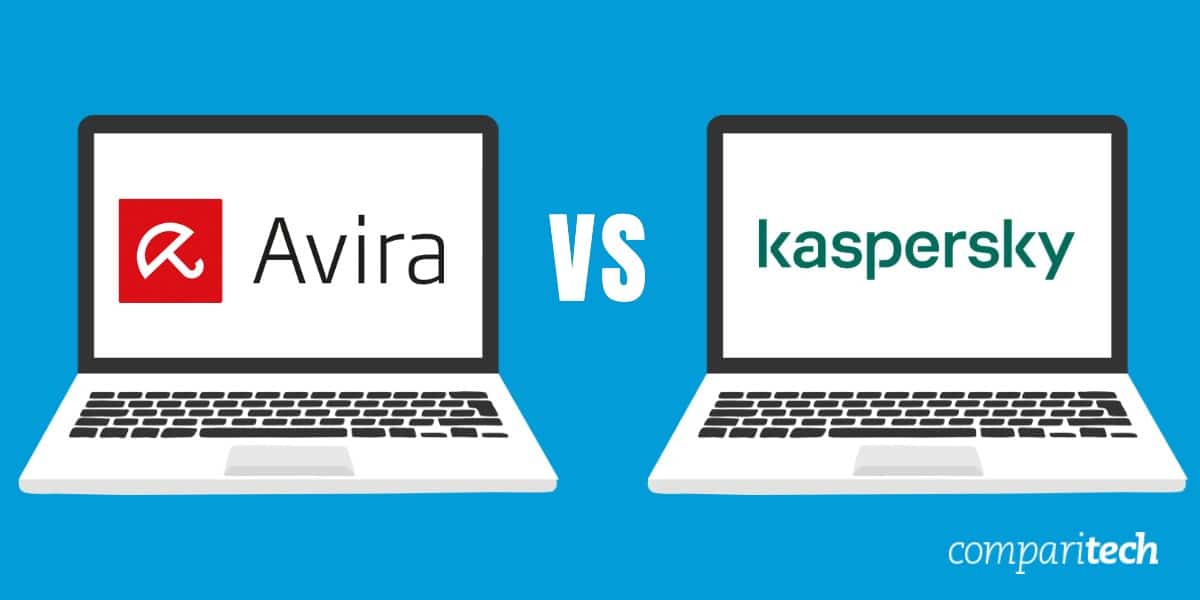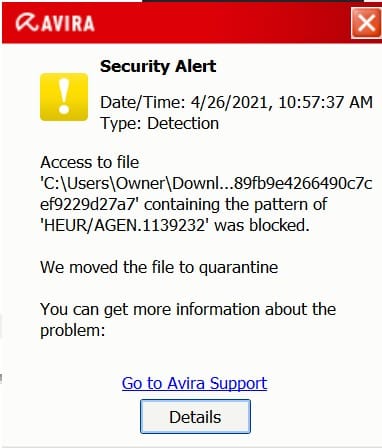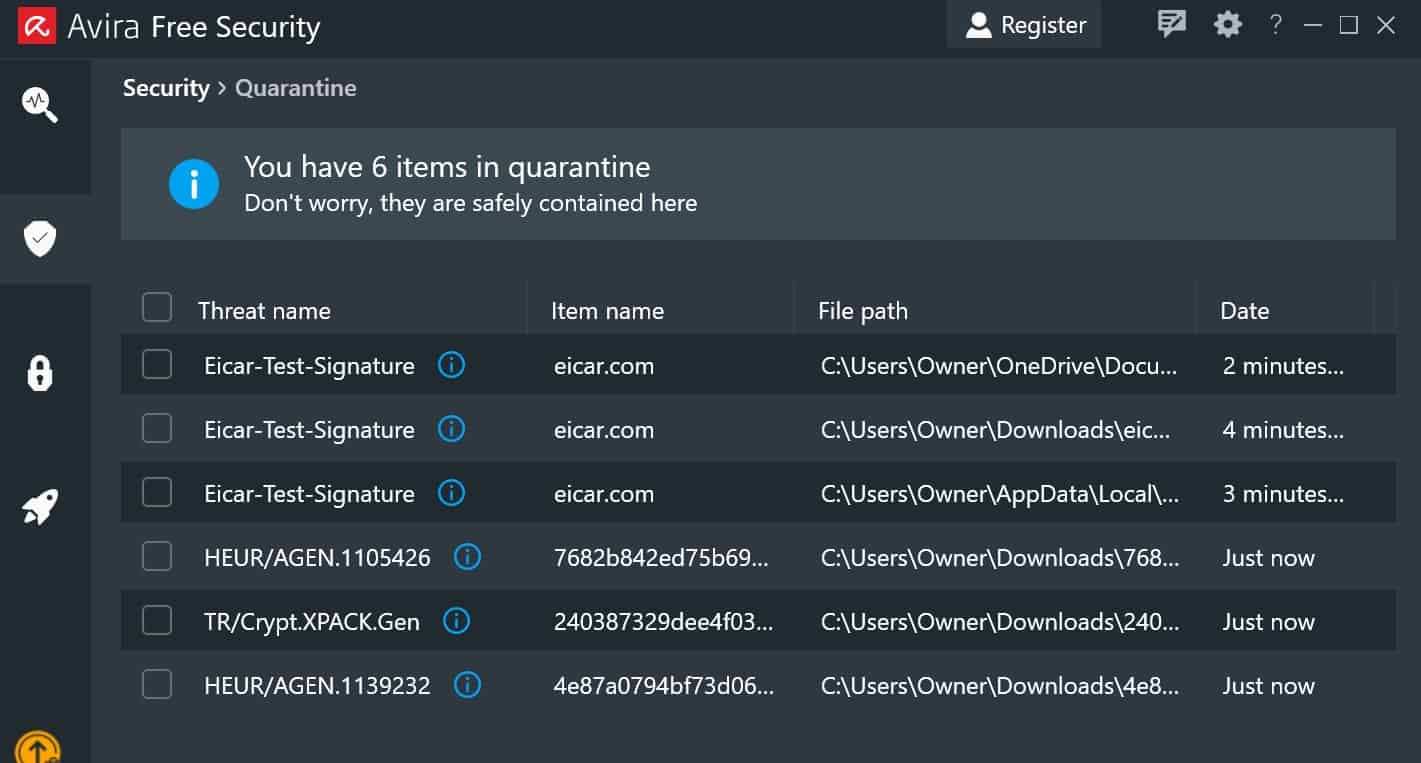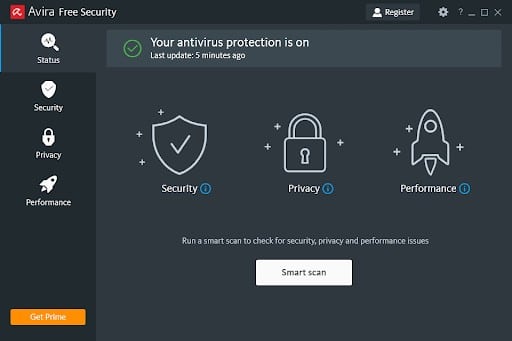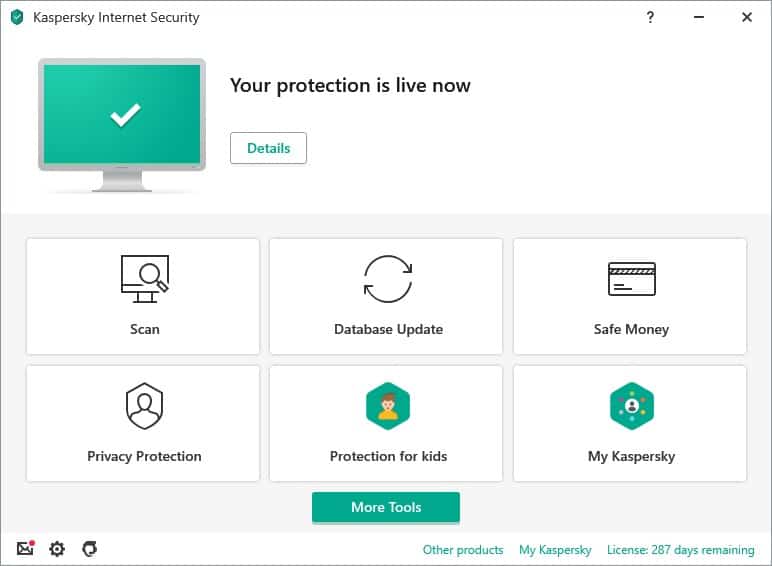How well do Avira and Kaspersky protect your device? To examine Avira and Kaspersky’s effectiveness, I will run two main malware tests to measure how well the programs block viruses in real-time and on-demand for my PC.
While malware protection is the key factor to consider, it’s not the only one. I’ll also test performance and speed, look at the ease of use of the software, plus review what extra features are included from each provider. I will also look at customer support and pricing to give an overall view of the best provider.
Want the result now? While it was a close contest between two good products, Kaspersky just had the edge over Avira in terms of an overall package. It provides strong malware protection, and with the features it offers, it is a good value package for consumers.
To get the full details of everything I discovered on Avira and Kaspersky, see the full breakdown below.
Summary: Avira vs Kaspersky
Avira
- Strong performance in real-time scanning test
- Automatically updates your apps
- Password protection
Kaspersky
- Ransomware protection
- Banking protection
- File backup (PC)
| Feature | Avira Internet Security | Kaspersky Total Protection |
|---|---|---|
| Antivirus and antispyware | ✔ | ✔ |
| Firewall | ✖ | ✔ |
| Webcam protection | ✖ | ✔ |
| Password manager | ✔ | ✔ |
| Anti-phishing | ✔ | ✔ |
| Ransomware protection | ✔ | ✔ |
| Banking and payment protection | ✔ | ✔ |
| Parental control | ✖ | ✔ |
| Network attack protection | ✖ | ✔ |
| Encrypted storage | ✖ | ✖ |
| Automatically update apps | ✔ | ✖ |
| VPN | ✖ | ✖ |
| PC cloud backup | ✖ | ✔ (On PC) |
| File shredder | ✖ | ✖ |
| Performance optimization | ✖ | ✖ |
| Identity theft protection | ✔ | ✖ |
| Run suspicious apps in sandbox | ✔ | ✖ |
BEST DEAL FOR AVIRA:Save 40% on Avira Prime to try all of the features before you commit to a subscription.
BEST DEAL FOR KASPERSKY:Save up to 50% on a Kaspersky subscription and protect up to five devices at the same time.
Background
Avira
Avira has steadily grown in popularity over the years and was named AV-Comparatives product of the year in 2008. Its products help to protect more than 300 million devices and it offers a range of free and paid for products to suit different users.
Kaspersky
Kaspersky is a Russian cybersecurity brand that has expanded into multinational territories. It was founded by Eugene Kaspersky, Natalya Kaspersky, and Alexey De-Monderik in the late 1990s. The company has continued to expand abroad and its revenue grew to $704 million by 2020.
Avira vs Kaspersky pricing
Avira Free Security is a free antivirus programme that can be downloaded from the Avira website. The free edition of Avira software comes with a virus and malware scanner as well as a few limited extra capabilities. There’s a VPN, but you can only send 500MB of data through it per month. This makes it useful for a few specific purposes only.
Avira offers three premium suites in addition to the free version, each of which adds various tools to the primary antivirus scanner.
| Avira Free Security | Avira Antivirus Pro (1 device) | Avira Internet Security | Avira Prime |
|---|---|---|---|
| Free | $40.00 per year | $52.00 per year | $114.78 per year |
Avira Antivirus Pro
Avira Antivirus Pro is offered in three different configurations: one, three, or five devices. One device costs $40.00 (GBP £29.53) per year to cover. It’ll set you back $64.00 (GBP £47.25) for three devices, and $74.74 (GBP £55.18) for five.
Avira Internet Security
Two more functions are included with Avira Internet Security: a software updater and a password manager. For one device, the annual subscription for this bundle is $52.00 (GBP £38.39) per year. Users can cover up to five devices for one, two, or three years, much like Avira Antivirus Pro.
Avira Prime
Avira Prime is the company’s most expensive bundle. The price rises to $114.78 (GBP £84.73) per year, however this covers up to five devices. Avira Prime also comes in a version that covers up to 25 devices, making it ideal for a family. The annual fee is $149.67 (GBP £110.48).
If you’re wondering what you receive for the extra money, Avira Prime includes an unlimited VPN service as well as PC performance enhancement tools.
Kaspersky Security Cloud is a free version of the Russian firm’s software, and there are four distinct paid editions available for purchase. Let’s look at what is included with each version.
Kaspersky Security Cloud
The free version shields your device from the most common malware threats. If you need more than just the basic level of security, the more complex packages mentioned below do provide you with additional features, but of course they come with a fee.
Kaspersky Anti-Virus
This version features anti-phishing capabilities to protect you from scams and offers real-time protection. It also comes with performance optimization features to ensure that your device runs smoothly.
Kaspersky Internet Security
On top of everything provided in the Kaspersky Anti-Virus package, this tier in the Kaspersky range puts in a decent amount of additional capabilities. A VPN webcam protection, screen management tools, payment security, and more are all available.
Kaspersky Total Security
Total Security is a more expensive alternative that contains everything in the other suites as well as some important extra tools. A GPS child location tool, file protection, and a password manager are among the features.
Kaspersky Security Cloud Personal
Security Cloud Personal allows users to customize their security package. Users can choose to install all of the bundled apps and features or just the ones that are relevant to their needs. In comparison to the other tiers, this suite includes three more premium features. These are account checks for Netflix, Facebook, and other prominent services to see if hackers have your email address. A home network monitor and a hard disc health monitor are also included.
| Kaspersky Security Cloud | Kaspersky Antivirus | Kaspersky Internet Security | Kaspersky Security Cloud | Kaspersky Total Security - 5 devices |
|---|---|---|---|---|
| Free | $59.99 (GBP £44.28) per year | $79.99 (GBP £59.04) per year | $89.99 (GBP £66.42) per year | $99.99 (GBP £73.81) per year |
Kaspersky has a generous $50 (GBP £36.91) discount on its Total Security suite. This reduces the total price to $49.99 for the first year.
If you’re looking at protecting more than just a Windows PC, both Kaspersky and Avira work with all the major operating systems which include Windows, Mac, and Android devices.
Effectiveness against malware
What are the strengths and weaknesses of Avira and Kaspersky when it comes to malware protection? Is it possible for the live scanner to detect viruses in files that have been downloaded from the internet? Do on-demand scans reveal any viruses on the computer’s hard drive?
To discover this, I devised a series of experiments. This includes downloading four EICAR (European Institute for Computer Antivirus Research) sample files as well as three malicious apps that hide viruses like trojans and adware.
Real-time scanning results
I began by downloading the four EICAR sample files to observe how the real-time scanner discovered and eliminated them, or even if it allowed the download.
In my real-time tests, Avira worked well, but not flawlessly. All three live files and three of the four EICAR files were blocked by Avira’s real-time scanner.
It allowed one EICAR file in a ZIP folder, but it rejected the file when trying to extract it from the zipped folder.
| Test File | EICAR Sample 1 | EICAR Sample 2 | EICAR Sample 3 | EICAR Sample 4 | Live Sample 1 (Adware) | Live Sample 2 (Trojan) | Live Sample 3 (Trojan) |
|---|---|---|---|---|---|---|---|
| Avira | Blocked | Allowed | Blocked | Blocked | Blocked | Blocked | Blocked |
| Kaspersky | Blocked | Blocked | Blocked | Blocked | Blocked | Detected | Detected |
The results of the same test using Kaspersky’s software are presented in the table above.
In real time, everything was successfully discovered and blocked by the program. Eicar samples were not allowed, and live samples were erased as soon as they were unlocked and unzipped.
On-demand scans
I used the on-demand scanner to see how well Kaspersky and Avira can detect and remove malware that is already on the PC or attached via an external hard drive or USB.
I disabled the antivirus’s real-time scanning feature for this test so that I could download the EICAR and live samples to my device. I then performed a quickscan before doing a full scan to record the results.
I conducted the quickscan, which is designed to check the most visible sections of your computer rapidly. Avira’s fast scan took 41 seconds, whereas Kaspersky’s took 273 seconds. The quickscan for both vendors were rapid, but also failed to discover any malware. This is not uncommon, most other quickscan tests I’ve done with other antivirus programs fail to find malware during a quickscan.
The on-demand full scans had more success. Avira’s full scan found three of the seven files, however Kaspersky’s complete scan found all malware and removed all EICAR test malware and the three live samples.
The largest drawback was Kaspersky’s lengthy full scan, which took 3 hours and 47 minutes to complete and scanned about 2.1 million files.
Kaspersky came out on top in terms of the depth of its scans. It took 227 minutes to check the 2,100,000 files, while Avira checked significantly fewer files (612,851), but it was far faster, taking only 29 minutes to complete.
| Test Type | Full Scan Time (minutes) | Full Scan # Items Scanned |
|---|---|---|
| Kaspersky | 2270 | 2100000 |
| Avira | 29 | 612851 |
Next, I checked the latest independent antivirus lab test results to see how well Avira and Kaspersky performed against a larger set of malware.
AV-Comparatives
The AV-Comparatives Real World Protection Test was last conducted between July and October of 2021.The test pitted 17 different antivirus software providers against a set of 743 internet-based dangers.
Avira was able to protect against 99.2 percent of the threats, whereas Kaspersky was able to protect against 99.9 percent of the threats.
Avira was ranked fourth to last out of 17 antivirus programs. Even if the percentile differences across all of the providers are tiny, they add up to a significant difference in how likely the antivirus program is to be bypassed by malware.
The test also tracks false positives. When an antivirus program flags a file as a potential threat when it is actually harmless, this is known as a false positive.
A large number of false positives irritate the user since they cause unnecessary alarm and disturbance. Avira produced only one false positive, whilst Kaspersky identified none. Both providers performed admirably in this area.
The Malware ProtectionTest evaluates how well each antivirus application detects threats that are already present on the hard drive of a device rather than being downloaded from the internet.
10,020 recent and prevalent malware samples were utilized in the most recent malware protection tests, performed in September 2021.
Kaspersky had an offline detection rate of 84.7 percent, an online detection rate of 87.6 percent, and an online protection rate of 99.90 percent. During the test, it generated two false alarms.
Avira achieved 91.6 percent for offline detection, 95.3 percent for online detection, and 99.98 percent for online protection. During the test, it generated four false alarms.
AV-Test Results
The most recent test data from AV-Test is from September and October 2021. In September and October, Kaspersky received a perfect score against 0-day real-world threats, using 407 malware samples. Another test employing 18,521 samples was undertaken to determine performance against widespread malware detected in the previous four weeks.
In September and October, Kaspersky provided 100 percent protection.
In September, Avira achieved 100 percent protection in the test, and it scored 99.5 percent in October. It received a score of 99.9 percent in September and 100 percent in October in the widely used malware test.
Impact on PC performance
When the real-time scanner is turned on in the background, how do Avira and Kaspersky affect PC performance? How much of an influence does a full system scan have? Is either of these slowing down your PC and interfering with your day-to-day tasks?
To find out, I conducted some tests. The results of the quick scan on system resources are shown in the table below.
| Test Type | Control CPU Utilization % (no scan) | Control Memory Utilization % (no scan) | Control Disk Utilization (MB/s) (no scan) | Quick Scan CPU Utilization % | Quick Scan Memory Utilization % | Quick Scan Disk Utilization (MB/s) | Quick Scan Time (seconds) |
|---|---|---|---|---|---|---|---|
| Avira | 9 | 65 | 31 | 32 | 70 | 36 | 41 |
| Kaspersky | 46 | 70 | 12 | 71 | 73 | 531 | 273 |
In my performance tests on Avira, I detected a 5 percent increase in memory consumption during a quick scan. There’s also a five-MB/s rise in disk utilization, as well as a 23 percent increase in CPU consumption. Kaspersky’s CPU consumption increased by 25 percent, memory utilization increased by 3 percent, and disc utilization increased from 12 MB/s to 273 MB/s.
After that, I made a note of the impact of a complete system scan on the system’s resources.
The findings are shown in the table below.
| Test Type | Control CPU Utilization % (no scan) | Control Memory Utilization % (no scan) | Control Disk Utilization (MB/s) (no scan) | Full Scan CPU Utilization % | Full Scan Memory Utilization % | Full Scan Disk Utilization (MB/s) |
|---|---|---|---|---|---|---|
| Avira | 9 | 65 | 31 | 39 | 72 | 170 |
| Kaspersky | 46 | 70 | 12 | 100 | 76 | 316 |
During the full system scan, Avira’s CPU use increased from 9 percent before the scan to 39 percent during the scan. Memory utilization climbed by 7 percent, while disc utilization grew by 139 megabytes per second.
Kaspersky’s complete scan revealed a significant increase in CPU usage, jumping from 46 percent to 100 percent. Memory utilization increased by 6 percent, but disk utilization climbed from 12 to 316 megabytes per second.
I looked at the most recent available lab tests to see how AV-Comparatives assessed the performance of Avira and Kaspersky. The test determines how quickly a PC can do common tasks while antivirus software is installed. The following list of task were assessed by the lab:
- Downloading files
- Browsing websites
- File Copying: first and subsequent run
- Installing and uninstalling applications
- Archiving and unarchiving
- Launching applications: first and subsequent run
The most recent data on PC performance was collected in October 2021.
For seven of the tests, Avira was rated as very quick; only its performance on file copying on the first run was assessed as slow.
For seven of the eight tasks, Kaspersky was scored as very quick. The only task for which it did not receive a perfect score was launching apps on the first run, despite this it was still classified as fast so most users would not notice any slow down on their PC.
Avira vs Kaspersky features
Additional features differ between antivirus companies and even between the package tiers available. To make it easier to compare the primary feature list, I’ve included a quick description of each software bundle’s essential features and what it can achieve for the user below.
- Anti-ransomware
- Device Control
- Real-time protection
- Secure surfing
- Data and identity protection
- Next-gen AI for real-time threats
- Defends against viruses, ransomware, and more
- Protects without slowing you down
- Easy to set up and use
- Works on PC, Mac, and mobile
- Blocks phishing
- Encrypted browser
- Safe Kids
- Password Manager
- File Protection
Here’s a little more information on some of the key features:
- Ransomware protection: This feature provides an additional degree of protection against ransomware specific threats. Ransomware encrypts your files and makes it impossible for you to access them until you pay a ransom.
- Data and identity protection: This function helps protect your personal details when making purchases online, by making it harder for hackers to read and use your data.
- Device Control: Examines and manages any removable devices attached to your computer. Stops external disk from causing serious damage.
- Safe kids: Flexible tools to help you keep an eye on your children’s activities, and monitor their behavior. Keep track of your children wherever they go. Set up a secure zone for them to stay in and be notified if they leave it.
- Password manager: Keep your passwords safe in a private vault, and access them with a single click from any device, so they’re there when you need them.
- File protection: The File Threat Protection feature protects the computer’s file system from infection. Viruses and other dangers are detected by scanning files that are opened or launched on the computer and its associated drives.
Signup and installation
Your total annual cost, plus the discount applied on your subscription is displayed on the Kaspersky signup page. The checkout also lets you subscribe to more devices and include professional setup at an extra cost. Auto renewal is turned on by default, however if you don’t intend to maintain the subscription at the full price after a year, switch it off to prevent a shock on your bank statement a year from now.
For home antivirus consumers, Kaspersky provides a variety of support solutions. There’s an AI assistant to help you with your questions, as well as live chat assistance if you need to speak with a live person.
A help ticket system, phone support, and a knowledge base that answers all of the most popular queries people have about Kaspersky software are also available.
Avira is simple to install, and once you’ve completed the three check out forms to input your card details, personal info, and check the purchase, you’ll receive a download link for your chosen software. The download only takes a few seconds, and once you execute the installation file, you’ll be taken through a few simple steps to get the program fully operational.
How easy is the interface to use?
The Avira user interface is quite straightforward. It isn’t crowded, which makes it very easy to view your PC’s health status and whether it’s presently secure or if there are concerns you need to address. The black, white, and gray hues are subtle, and prominent symbols guide you to the important protection, privacy, and performance categories.
Kaspersky’s design is simple and elegant. Every feature has its own graphic, which gives you a visual representation of what it does. You can easily navigate to the features and see how long you have left on your subscription.
Kaspersky also uses a notice to inform users of their device’s current condition. The bottom right corner of the screen lists all of the extra features that aren’t featured on the home display.
Customer support
Avira has a phone number for customer service, as well as email and video tutorials on its website’s help page. There’s also a page dedicated to software upgrades and advising users of any significant changes.
Kaspersky provides a fantastic support center with videos as well as other important material that should help you with your problem.
You can also contact a representative via email or online chat between the hours of 7 a.m. and 1 a.m., seven days a week.
Which antivirus is more user-friendly?
When it comes to user-friendliness, Avira’s interface is designed with simplicity in mind, allowing users to effortlessly navigate and utilize its features. This intuitive design is particularly beneficial for those who may not be tech-savvy, instilling a sense of comfort and confidence in their ability to use the software effectively.
On the other hand, Kaspersky, while also user-friendly, has a more complex interface due to its extensive range of features and settings. These include advanced threat detection, customizable scan options, and detailed security reports, which might be overwhelming for some users who prefer a simpler interface.
Which antivirus has better speed and performance?
When it comes to speed and performance, Kaspersky is a clear winner. Kaspersky’s software is engineered to have a minimal impact on system performance, ensuring that users can run scans and use their devices without experiencing significant slowdowns. This efficiency, as highlighted by independent tests and user reviews, should reassure users about the software’s performance.
While also performing well, Avira tends to have a slightly higher impact on system resources, which can lead to slower performance during scans and other intensive tasks.
Which antivirus offers better user privacy?
When it comes to user privacy, Avira is the champion. Avira, headquartered in Germany, a country with stringent data protection laws, offers users a high level of privacy assurance. Avira’s commitment to user privacy, coupled with its policy of not collecting unnecessary data, should instill a sense of security and protection in users.
Although Kaspersky has robust security measures, it faces scrutiny due to its Russian origins, which raises concerns about potential government access to user data.
Avira vs Kaspersky conclusion
In this comparison, Kaspersky comes out on top. It had the best malware detection results in my tests, picking up all seven test files in its on-demand scan. It offers more functionality than Avira and outperforms Avira in independent AV testing labs by a small margin. In addition, Kaspersky gives substantial discounts for the first year of subscription, lowering the cost of using its software.
See also:

